Winners of the 2023 Book Prizes
BEST BOOK IN LITERARY STUDIES
Rory Finnin, Blood of Others: Stalin's Crimean Atrocity and the Poetics of Solidarity. University of Toronto, 2022.
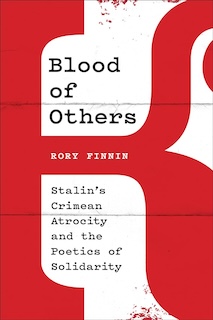
Rory Finnin’s Blood of Others: Stalin’s Crimean Atrocity and the Poetics of Solidarity stands as a remarkable achievement in literary research and scholarship. A groundbreaking study of literary and cultural responses to the deportation of Crimean Tatars, it offers a new approach to studying a region deeply shaped by imperial conquests and geopolitical anxieties. Finnin skillfully analyzes both canonical and non-canonical works from the Crimean Tatar, Ukrainian, Turkish, and Russian traditions, unveiling the complex dialectics of colonial practices across poems, prose, journalistic texts, and films. Drawing on multilingual sources from various epochs, Finnin meticulously examines their circulation, reception, and censorship histories, and uncovers various ways of resistance to colonial practices, resettlement, and discursive erasure. An inspiring example of studying “text and reader, word and deed, artifice and affect,” this monograph offers a powerful model of investigative literary analysis. It is a must-read for anyone working on the cultural history of the Black Sea region, and an inspiration to our field, which still has much work to do in rescuing voices from unjust oblivion, reckoning with the horrors of colonialism, and forging new ties of cross-cultural solidarity.
THE SVETLANA BOYM BEST BOOK IN CULTURAL STUDIES
Juliane Fürst, Flowers Through Concrete: Explorations in Soviet Hippieland. Oxford University Press, 2021.
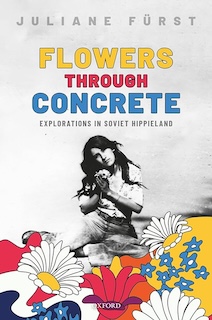
A marvel of ethnographic and archival research, Juliane Fürst’s Flowers Through Concrete: Explorations in Soviet Hippieland is a deep dive into the history and cultural significance of the alternative “sistema” created by its countercultural protagonists. This remarkable book explores the crucial role in the development of Soviet hippiedom played by Soviet anti-hippie propaganda(which inadvertently served as a “how-to” guide for wood-be hippies), the origins and significance of kaif (hippie slang covering coolness, pleasure, and narcotic bliss), the fascinating overlap between late socialist norms and hippie nonconformity, and the comical, tragic, and confusing adventures of (former) Soviet hippies as they moved into middle age, adjusted to post-Soviet life, and, in some cases, emigrated. Flowers Through Concrete is a testament to the author’s interpretive prowess and generosity of spirit. Fürst’s book offers enough kaif to satisfy even the most diehard hippie.
BEST FIRST BOOK AWARD
Sasha Senderovich, How the Soviet Jew Was Made. Harvard University Press, 2022.

Caught between tradition and modernity, the Soviet Jew as a cultural figure exemplified liminality during a period of massive upheaval and social change. As Sasha Senderovich compellingly argues in How the Soviet Jew Was Made, Jewish writers and filmmakers harnessed the expressive power of the Soviet Jew to contest, complicate, and even reimagine what it meant to “become Soviet” in the aftermath of the Bolshevik Revolution and during the early Soviet period. Through insightful close readings that uncover the multifaceted meanings of source texts and their implications for understanding Jewish identity, How the Soviet Jew Was Made challenges traditional understandings of this figure and thus makes a remarkable contribution to scholarship. Readers will find Senderovich’s analysis both thorough and highly readable as he adroitly moves between Russian and Yiddish texts and offers thought provoking interpretations that weave together new theoretical approaches with sound scholarly analysis. How the Soviet Jew Was Made brings new insights into works by David Bergelson, Moyshe Kulbak, and Isaac Babel, as well as several evocative films, including The Return of Neitan Bekker, Seekers of Happiness, The Border, and Gorizont. Ultimately, Senderovich’s book proves to be a masterful study of the Soviet Jew and is sure to inspire generations of future scholars and readers.
BEST EDITED MULTI-AUTHOR SCHOLARLY VOLUME
The Pedagogy of Images: Depicting Communism for Children, ed. by Marina Balina and Serguei A. Oushakine. University of Toronto Press, 2021.
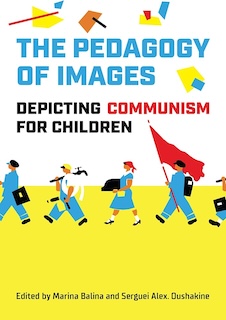
This superbly executed and beautifully illustrated volume on how Soviet-style communism was (quite literally) marketed to the next generation stands to make a significant and original contribution to a number of disciplines. While the list of authors is broad, ranging from those studying art and photography, to children’s literature, the volume's focus on a clearly stated and fecund set of research questions makes it highly cohesive. The volume stands out for being exceptionally well-edited and to the highest scholarly standards. At the same time, the writing throughout is compelling, making this a great read for specialists and general readers alike.
BEST POETRY TRANSLATION INTO ENGLISH
Anna Glazova, For the Shrew, trans. by Alex Niemi. Zephyr Press, 2022.
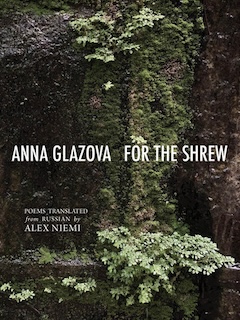
Anna Glazova's quietly commanding poems are typically brief and perfectly crafted with no extraneous verbiage. Zephyr’s handsome bilingual edition offers each crystalline poem in its original Russian next to Alex Niemi's English translation, which consistently preserves Glazova’s striking thoughts and spiky construction while managing to bring the contents effectively into a new language. Carrying over a judicious selection of poems from Glazova’s original collection (Для землеройки, Dlia zemleroiki, 2013), this volume offers a compact but definitive introduction to one of the most absorbing voices of Russophone poetry today.
Glazova’s verses are characterized by their fixed – sometimes quizzical – attention to the natural world beyond human experience, with each poem serving as the revelation of a state of being, ranging from the momentary to the eternal. The poet’s post-human ontology of language is powerfully described in a concise foreword, also translated from the original. As for the poems themselves, Niemi expertly handles all the idiosyncrasies of Glazova’s style as well as the inevitable differences of Russian and English grammar. The terseness and wide-ranging curiosity of Glazova’s poetry are conveyed beautifully: the verbal sparsity of the original poems renders such issues as the lack of a present copula in Russian vs. its obligatory status in English particularly difficult, but Niemi navigates them with aplomb. The Translator’s Afterword is also unusually absorbing, describing both Niemi’s direct collaboration with Glazova and the poet’s knowledge of the German lyric tradition as a crucial mediator for her writing. A true achievement, this book is an exceptional resource both for newcomers to contemporary Russian lyric and for its connoisseurs.
BEST PROSE TRANSLATION INTO ENGLISH
Miljenko Jergović, Kin, trans. by Russell Scott Valentino. Archipelago Books, 2021.
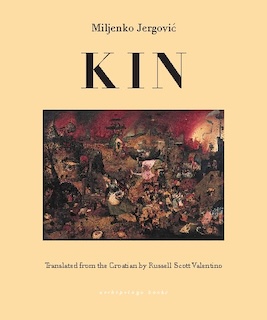
Miljenko Jergović’s Kin (orig. Rod, 2013) is a truly monumental chronicle of the author-narrator's family story that at the same time reveals crucial events of twentieth-century history, running from the days of the Austro-Hungarian Empire through the Kingdom of Serbs, Croats, and Slovenes and into socialist Yugoslavia as well as its present-day successor states. The “kin” of the title are interwoven, chapter by chapter, with their neighbors, friends, and even more distant connections; the "we" of the text often speaks of an era before Jergović himself was born.
Russell Scott Valentino's translation is both sensitive and authoritative, drawing the reader into episode after episode of a complex history in which everyone is related, either by the literal ties of blood or marriage or by the narrative logic of everyday cause and effect. Besides keeping scrupulous track of the tale’s many players across more than 900 pages, and carefully cross-referencing known public history with the intimate turning points of family lore, Valentino captures the tone of Jergović’s narration: deceptively wry, understated, and matter-of-fact, in a manner that renders his occasional outbursts of emotion all the more striking. The translator’s extensive online “Reflections on Kin,” referenced in this edition’s brief afterword, are also worthy of note as a rewarding supplement to the book, illuminating the point-by-point decisions that went into the final translation. Archipelago has performed a great service in publishing this historically and aesthetically rich English-language rendition of a mature masterwork by a major figure of post-Yugoslav letters.
BEST CONTRIBUTION TO THE STUDY OF SLAVIC LINGUISTICS OR SECOND LANGUAGE ACQUISITION
The Art of Teaching Russian. ed. Evgeny Dengub, Irina Dubinina and Jason Merrill. Georgetown University Press, 2020.
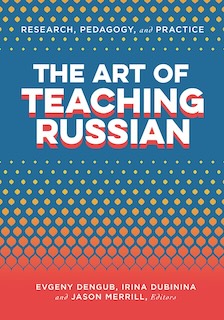
The Art of Teaching Russian offers a uniquely multifaceted fusion of scholarship on Russian language teaching practices, learning, and curriculum development. This edited collection, enriched with insights from leading professionals, has instantly become an essential resource for any scholar or practitioner interested in exploring the history and current landscape of providing instruction in Russian language, culture, and relevant subfields. Unveiling the journey from past methodologies and paradigms to contemporary trends in foreign language education, it offers an impressive survey of various pedagogical strategies tailored for different proficiency levels. The volume delves into the issues of proficiency standards, content-infused curriculum development, representation of diversity in teaching materials, preparation of graduate teaching assistants, and explores technology assisted tools informing research methods and instructional practices. It is not just a book but an enriching journey into the heart of teaching Russian.
BEST CONTRIBUTION TO PEDAGOGY
Pro-dvizhenie: Advanced Russian through Film and Media. by Alyssa DeBlasio and Izolda Savenkova. Georgetown University Press, 2022.
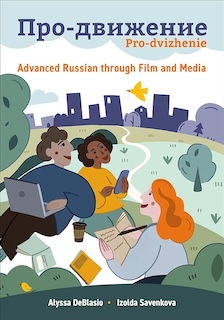
Pro-dvizhenie: Advanced Russian through Film and Media offers a fresh and exciting approach to teaching upper-levels of Russian. Via compelling films, television series, and media in the target language, the textbook enables students to hone their language skills in both productive and receptive modes at the advanced level on the ACTFL scale. Authors Alyssa DeBlasio and Izolda Savenkova are to be commended for the diversity of perspectives and the breadth of activities they provide. Also noteworthy is the textbook’s innovative modular construction: instructors have the freedom to select the pieces of media and accompanying exercises that will work best for their students and programs. This structure allows for Pro-dvizhenie to be used for one semester or an entire academic year, thus providing much appreciated flexibility. Moreover, the films and series featured in the text are available online and, thanks to the companion website, students are empowered to delve deeper into the specific content and extension exercises that appeal to them. Such extensive student agency is unique for textbooks at this level and sets a new standard for Russian language pedagogy.
